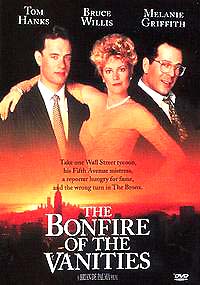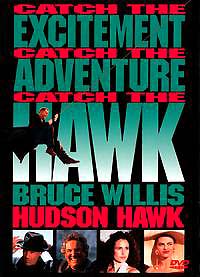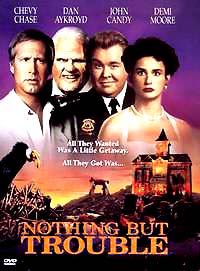
|
|
|
(chronologically, by film title) Intro | Summary Chart | Silents-1949 | 1950 -1966 | 1967-1969 | 1970-1974 | 1975-1977 | 1978-1979 1980 | 1981 | 1982 | 1983-1984 | 1985-1986 | 1987-1989 1990-1991 | 1992-1994 | 1995 - 1 | 1995 - 2 | 1996-1997 | 1998 | 1999 | 2000 | 2001 - 1 | 2001 - 2 2002 - 1 | 2002 - 2 | 2002 - 3 | 2003 | 2004 | 2005 | 2006 | 2007-2011 | 2012-2014 | 2015-2017 | 2018-2019 | 2020-2021 |
|
| Film Title, Director, Studio, Budget Information, Description | |

|
The Bonfire of the Vanities (1990) This political satire was a watered-down, ill-fated film version of Tom Wolfe's best-selling novel, directed by Brian De Palma. The sanitized film was advertised with the tagline: "An outrageous story of greed, lust and vanity in America." For one thing, it was a major mis-casting mistake (and financial burden with multi-million dollar contracts for the two lead actors, causing budget overruns) to have actor Tom Hanks play the role of slick yuppie Wall Street stockbroker Sherman McCoy, and rising egotistical Bruce Willis star as alcoholic American tabloid journalist Peter Fallow (the character was English in the novel). Melanie Griffith was also featured as Sherman's gold-digging mistress Maria Ruskin, and Kim Cattrall as Sherman's wife. The story involved a hit-and-run car accident in the Bronx that resulted in the death of a black teenager, the efforts of Sherman and Maria to avoid detection and how the story was subsequently pursued. The interfering studio insisted on making the anti-heroic character of Sherman more likable, and the entire script more politically correct (and less anti-Semitic), so it was rewritten to change the character of a white Jewish judge named Myron Kovitsky working in a racially-mixed NYC borough (originally to be played by Walter Matthau or Alan Arkin) to a sympathetic black judge named Leonard White (Morgan Freeman). In the final fabricated scene, Sherman McCoy was exonerated and righteous Judge White lectured the courtroom mob on "decency." Critics hated the ill-conceived film, and audiences familiar with the original novel stayed away, believing all along that Wolfe's book couldn't be properly translated to the screen. The film was so notorious and excessive that Wall Street Journal journalist Julie Salamon wrote a best-selling account of the film's making called "The Devil's Candy." The film was nominated for five Razzie awards: Worst Actress (Melanie Griffith), Worst Director and Worst Picture (DePalm), Worst Screenplay and Worst Supporting Actress (Kim Cattrall). |

|
Hudson Hawk (1991) Columbia/TriStar's action-comedy film was an ill-fated, unfunny, comic-bookish (with awful sound effects) and poorly-executed attempt at an action crime-caper-heist flick (with homage to Cary Grant in Hitchcock's To Catch a Thief (1955), the James Bond films, comic Buster Keaton and Leslie Nielsen in The Naked Gun (1988)). The absurdist film was misadvertised as an action film, to capitalize on Bruce Willis' recent starring role in Die Hard 2 (1990). The film's budget of about $65 million brought in box-office of only about $17 million domestically, although it did much better in foreign markets. Much of its expense was due to on-location shoots in New York, London, Rome, and Budapest. The convoluted film starred self-indulgent ex-TV star Willis in this vanity project as the smirky title character - a supposedly-reformed cat burglar named Eddie "The Hawk" Hawkins, with his singing partner-in-crime Tommy Five-Tone (Danny Aiello), as well as Andie MacDowell in a multiple role as schizophrenic nun Sister Anna Baragli, a Vatican art appraiser and an undercover agent. Some speculated that the failed film was cursed by the pope for its sacrilegious depiction of a sexy nun. Just released from a penitentiary after serving a 10-year sentence, Hawk was hired by mobsters, led by the Mario Brothers, to steal priceless Leonardo da Vinci art pieces (including a horse statue with a secret crystal hidden inside, but split into three and hidden in three different art objects, that was part of a mechanism that could turn lead to gold) from an auction house, for a pair of stupid, over-the-top, evil husband-wife billionaires Darwin and Minerva Mayflower (Richard E. Grant and Sandra Bernhard) of Mayflower Industries intent on world domination by devaluing the world's monetary systems. This film included actor Willis' first (and sole) screenwriting story credit (he co-authored the story with Robert Kraft and rewrote large sections of the script). It received six Razzie nominations including Worst Actor (Willis), Worst Supporting Actor (Grant), and Worst Supporting Actress (Bernhard) and won three awards: Worst Director, Worst Picture (Joel Silver), and Worst Screenplay. In the year 2000, it was also nominated for Worst Picture of the 90s Decade by the Razzies, but lost to Showgirls (1995). |

|
Nothing But Trouble (1991) This unfunny, darkly comic, morbidly-twisted and stupidly over-acted film (originally titled Valkenvania - a spoof on the small ghost town of Centralia, Pennsylvania), comic actor Dan Aykroyd's debut feature film as director, was aptly named. The film was an attempt to comically spoof The Texas Chainsaw Massacre (1974) and Beetlejuice (1988) and various haunted house and "hanging judge" films. Aykroyd also appeared in the previous year's low-brow, police-buddy stinker comedy Loose Cannons (1990) where he was mismatched with Gene Hackman. After taking a wrong turn off the NJ Turnpike on their way to Atlantic City in his snazzy BMW, traveling NYC yuppie businessman Chris Thorne (Chevy Chase) and his new lawyer neighbor Diane Lightson (Demi Moore appearing right after her successful performance in Ghost (1990)) ended up captives of maniacal, deranged 106 year-old justice of the peace Judge Alvin 'J.P' Valkenheiser (Aykroyd) in a desolate place called Valkenvania. John Candy had the unfortunate dual task of playing the town's local sheriff Dennis Valkenheiser and the Judge's mute granddaughter Eldona (dressed in drag). Valkenheiser's lethal mansion was surrounded by a junkyard littered with wrecked automobiles, scrap metal and barrels of toxic waste, and the haunted house itself had spiral slides into the basement, skull and cross-bones, drop-out floors, and a fun-house roller-coaster ride that ended with a flesh-eating death machine called 'Mr. Bonestripper'. One of the most disgusting scenes was Valkenheiser eating a weiner-hot dog during a dinner scene. Thankfully, the film ended with the junkyard exploding from a natural gas leak. It deservedly received six Razzie Awards nominations including Worst Actress (Demi Moore), Worst Director and Screenplay (Aykroyd, co-scripted with his brother Peter), Worst Picture (Robert Weiss), and Worst Supporting Actress (John Candy), and won one Razzie: Worst Supporting Actor (Aykroyd). |